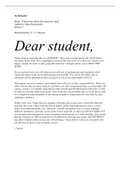SUMMARY
Book: ‘8 Questions about the conscious mind’
Author(s): Hans Dooremalen
Edition: 1
Summarized by: L. C. Claassen
Dear student,
Please keep in mind that this is a SUMMARY. This work contains merely the MAIN topics
and ideas of the book. It is a simplified version of the real work, so it does not contain every
single concept. In order to fully grasp the material, I strongly advise you to READ THE
BOOK.
If you read the book, you will come across all sorts of explanations and examples which
clarify the topics in the most sophisticated way possible. You will be far better able to
remember all the information that was given to you if you understand it FULLY.
Then again, you are a student, and students have all sorts of other responsibilities. There are
other courses that you must study for and there are other assignments that you must make. Of
course, at times, it is equally important to take a break and not think about school for a while
in order to rest and regain your focus. Next to all this, you probably have a social life as well.
It is completely understandable if you choose to make a compromise for your time by only
studying a summary.
If that is the case, I hope that my summary will help you on your way to learn the material
and pass the exam. I have tried my best to gather all the main information and to write it
down in an understandable way. However, I would recommend you to at least compare
different summaries, and take a look at the lecture material, so that you DO NOT MISS OUT
on any important information. I am a learning student myself, so I make mistakes. This means
that my summary is NOT an end-all be-all solution for passing your exam. And NEITHER is
any other summary that you may use. Nevertheless, I hope that it is of use to you and I wish
you the best of luck in your academic career.
- Lauran
,QUESTION 1: WHAT IS THE CONSCIOUS MIND?
Three types of mental states
1. Phenomenal experiences: how something feels or is experienced. Phenomenal experiences
consist of qualia (singular form: quale), which are the qualitative aspects of the experience
(e.g. the taste of coffee).
Also called:
- what-it-is-likeness
2. Cognitive state: a representation about something (e.g. a thought about a friend). The
property of being about something is called intentionality (which in this case does not refer
to wanting to do something on purpose).
Also called:
- aboutness
3. Emotion: a combination of the first two mental states: a feeling that is about something
(e.g. being in love with someone).
The relation between the conscious mind and the unconscious mind
- The mental states of the unconscious mind can become conscious given the right
circumstances. If a state cannot become part of the conscious mind, it is not a mental state
(e.g. the state that regulates the heartbeat).
- Cognitive states can be either unconscious or conscious. Phenomenal experiences are
always conscious.
Two mind-body problems:
1. How do qualia fit into the physical world?
2. How does intentionality fit into the physical world?
Science:
- Metaphysics: the discipline in philosophy that goes beyond physics. Metaphysics does not
take science into account.
- Science is the best way to gain knowledge, therefore, we cannot answer questions about the
conscious mind with philosophy alone. We also need science.
What is the conscious mind?
We do not know exactly what the conscious mind is and what its place in nature is.
, QUESTION 2: CAN THE MIND FUNCTION SEPARATELY FROM THE BRAIN?
- Dualism: the mind and body are separate.
- Separability thesis: the mind can exist separately from the physical world.
- Inseparability thesis: the mind cannot exist separately from the physical world.
- Both dualism and the separability thesis have no empirical support.
René Descartes
- Descartes’ method of gaining knowledge consisted of doubting everything. However, one
thing Descartes could not doubt was the fact that he was doubting. Since doubting was
thinking, you cannot doubt the fact that you are thinking. Therefore, thinking is existing. He
became famous for his sentence Cogito ergo sum (I think therefore I am).
- Descartes now reasoned that the ideas he perceives very clearly in his head must be true. He
said that humans are imperfect, so they could not be the origin of the ideas. God is perfect, so
the ideas must come from god. Therefore, ideas (or perceptions of the world) must originate
from god and must therefore also exist; Descartes is now certain that he has a mind and a
body. He called the mind and the body substances: things that can exist on their own.
- Thinking substance: thinks.
Owned by:
- humans
- Physical substance: is extended (is three dimensional).
Owned by:
- humans
- animals
Michel de Montaigne
- Montaigne was skeptic of Descartes and thought that nothing can be known for certain. He
is famous for the question Que sais-je? (What do I know?).
Princess Elisabeth
- Princess Elisabeth proposed the interaction problem to Descartes: the question how the
mind and body interact. Descartes thought that small particles through the body called animal
spirits would be able to move the body. The soul would interact with these animal spirits in
the pineal gland, a structure in the brain.
- Extended (physical) things would be able to move each other (imagine a ball rolling against
another ball and pushing it away). However, the thinking substance is non-extended.
In the end, Descartes could not answer the question how the non-extended mind is able to
move the extended animal spirits.





